Pamela Klassen, a professor in the Faculty of Arts & Science’s Department for the Study of Religion, is gathering a network of researchers, Elders, community members, museum professionals and students to help tell the “real history” of Treaty 3 — an 1873 land agreement between Anishinaabe (Ojibwe) leaders and the Crown to share land in northwestern Ontario and eastern Manitoba — in museums across Ontario.
Ojibwe treaty partners from the area around the Lake of the Woods, regarded treaties as sacred agreements and saw Treaty 3 as a promise to share the land. Settlers — if they acknowledged the treaty at all — thought of it as a land cession.
Klassen, who is also chair of the department, is one of five University of Toronto researchers receiving funding from this year’s Connaught Community Partnership Research Program for her project, Treaty Teachings: How Universities, Communities, and Museums Can Work Together to Tell the History of Treaty 3.
“We are so grateful that this project has been recognized by the Connaught Community Partnership Research Program,” says Klassen. “I want to acknowledge Dr. Krista Barclay, my postdoctoral fellow, for her intellectual leadership and community engagement work that helped to make this happen.”
“The online museum exhibit that results from this partnership will be a great opportunity to make our research accessible to new audiences and also create opportunities for experiential learning, skills development and networking for the students who contribute to the project.”
The Connaught Community Partnership Research Program, with funding from the Connaught Fund, supports new collaborative research projects, or early-stage partnerships between the University and community partners, gaining access to each other’s knowledge, expertise and capabilities — in the hopes that the partnerships may evolve and attract external funding.
Klassen’s Treaty Teachings project will focus on telling, teaching and displaying the history of Treaty 3.

“Fostering the reciprocal exchange of knowledge across sectors is really important. Building relationships beyond academia ensures that our research is accessible to broader audiences, but also that it is grounded in and responds to the the Indigenous and non-Indigenous communities who are invested in the work of being treaty people,” says Klassen.
“Treaty Teachings builds off our Kiinawin Kawindomowin Story Nations website, which is rooted in a long-term collaboration with Kay-Nah-Chi-Wah-Nung Historical Centre of the Rainy River First Nations.”
Her team will be working with provincial and local museums engaged in teaching and interpreting audiences about the history, spirit, and intent of Treaty 3, including the Fort Frances Museum and the Lake of the Woods Museum in Kenora, Ontario.
“Professor Klassen’s Treaty Teachings project is a wonderful example of the exceptional work that can come to fruition through collaboration with Indigenous peoples and community Elders, fellow researchers, museum professionals and students,” says Melanie Woodin, dean of the Faculty of Arts & Science. “By working to create online and in-museum exhibitions, as well as curricular resources for students, this project will help shed light on the real history of Treaty 3.”
For Klassen the Treaty Teachings project is especially important during a time when museums may not be seeing their usual numbers of visitors due to COVID-19.
“Local museums worldwide are facing a number of challenges and it’s more important than ever to create strong relationships and find ways to share knowledge and encourage visitor and student engagement whether in-person or online,” says Klassen. “We’re especially looking forward to the online teaching materials that will be developed during this project which will be useful for students and museum visitors of all ages.”
The Treaty Teachings project will culminate in travelling and online exhibitions with companion curriculum guides for online and in-class learning made available through the Kiinawin Kawindomowin Story Nations website, as well as partner organizations.
“The history of Treaty 3 is still being lived and made today and it’s important for all Canadians to engage with and understand the spirit and intent of the treaty and their responsibilities as treaty people,” says Klassen.

